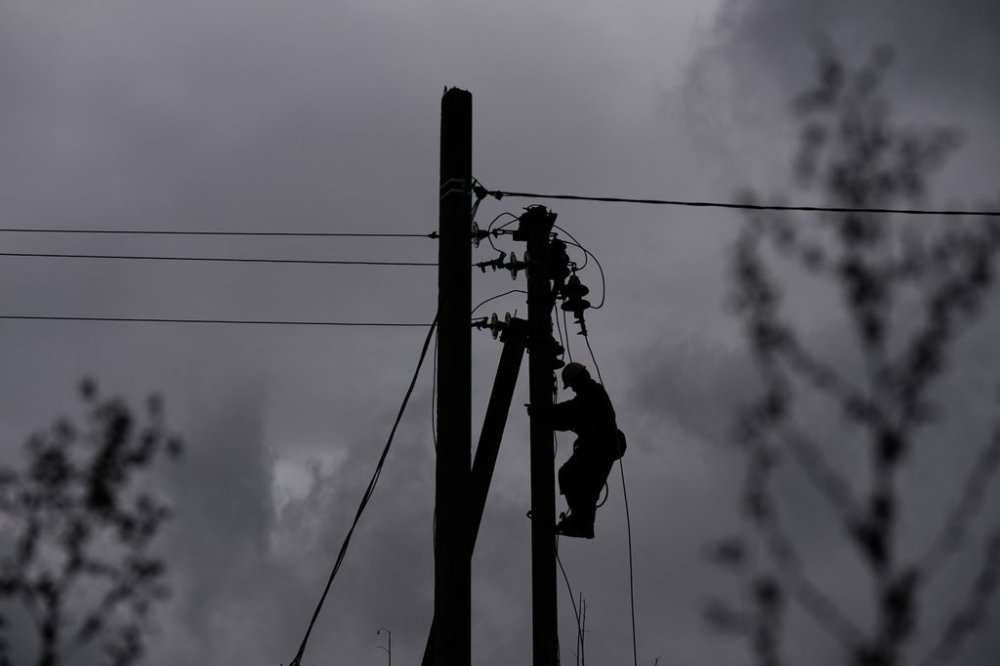World
Ukrainians Face Another Winter of Power Cuts Amid Renewed Attacks

Residents of Ukraine are preparing for a challenging winter marked by power cuts and blackouts as Russia intensifies its attacks on the country’s energy infrastructure. In the northern town of Shostka, 40-year-old Zinaida Kot faces the harsh reality of her situation, where the absence of electricity directly threatens her health. A patient reliant on dialysis, Kot fears for her life as power outages render her medical equipment inoperable.
The renewed Russian campaign has shifted tactics, focusing on specific regions and gas facilities. This strategic change has profound implications for millions of Ukrainians, many of whom have already begun relying on generators and stockpiling water, anticipating long hours without power or heat.
Impact on Daily Life and Health Services
In early October 2023, a Russian strike left Shostka—home to approximately 72,000 residents—without electricity, water, or gas service. While gas was later restored, electricity is now provided sporadically, with residents receiving power for only a few hours each day. Mayor Mykola Noha described the situation as “challenging,” highlighting the unpredictability of power cuts that leave residents anxious and without reliable access to essential services.
As winter approaches, the sounds of generators fill the air in Shostka. These machines are vital for powering businesses, hospitals, and homes. Local initiatives, such as “invincibility points,” have been established to provide residents with places to charge devices, warm up, and find refuge. In the local hospital, staff have improvised by building a wood-burning oven to prepare meals for patients, a necessary adaptation given the reliance on electric stoves.
The hospital’s chief, Oleh Shtohryn, noted that the facility has spent weeks operating on generators, a costly endeavor that consumes up to 250,000 hryvnias (approximately $5,973) weekly. Power is rationed, with dim lights in the dialysis ward reserved for equipment that sustains life. Tragically, one of the dialysis machines has already burned out due to the frequent blackouts, creating a significant hurdle for the hospital, which continues to treat 23 patients daily.
Shifting Strategies and Vulnerabilities
The situation in Shostka reflects a broader pattern of Russian attacks aimed at destabilizing Ukraine’s energy infrastructure. During the previous winter, Moscow launched extensive missile and drone strikes against national energy facilities. This year, however, the strategy has evolved to target specific regions, notably Chernihiv, Sumy, and Poltava, with heightened assault frequency.
Director of the Energy Research Center, Oleksandr Kharchenko, explained that Ukraine’s energy defenses have improved, making it difficult for Russia to achieve significant damage to national infrastructure. Consequently, Russian forces have opted to intensify strikes in areas closer to the front lines where vulnerability is greater. “These are attacks on civilians who have nothing to do with the war,” Kharchenko stated.
Electricity repair crews find themselves in perilous situations, repeatedly restoring power lines and stations amid ongoing threats. Electrical technician Bohdan Bilous expressed a sense of duty, stating, “It’s our job. Who else would do it? Nobody else would.” Yet, the challenges are immense, with repair teams becoming frequent targets.
As the weather turns colder, the impact of these attacks becomes increasingly dire. In the Chernihiv region, residents are accustomed to the sound of explosions, a grim reminder of the ongoing conflict. Despite efforts to repair damaged facilities, any new strikes can halt progress, leaving thousands without reliable electricity.
In summary, the winter of 2023-2024 in Ukraine promises to be fraught with difficulties as power cuts and service interruptions become a grim reality for many. The resilience of the Ukrainian people is tested as they navigate the challenges posed by ongoing hostilities, with the health and well-being of vulnerable individuals like Zinaida Kot hanging in the balance.
-

 World3 months ago
World3 months agoScientists Unearth Ancient Antarctic Ice to Unlock Climate Secrets
-

 Entertainment3 months ago
Entertainment3 months agoTrump and McCormick to Announce $70 Billion Energy Investments
-

 Lifestyle3 months ago
Lifestyle3 months agoTransLink Launches Food Truck Program to Boost Revenue in Vancouver
-

 Science3 months ago
Science3 months agoFour Astronauts Return to Earth After International Space Station Mission
-

 Technology2 months ago
Technology2 months agoApple Notes Enhances Functionality with Markdown Support in macOS 26
-

 Top Stories1 week ago
Top Stories1 week agoUrgent Update: Fatal Crash on Highway 99 Claims Life of Pitt Meadows Man
-

 Sports3 months ago
Sports3 months agoSearch Underway for Missing Hunter Amid Hokkaido Bear Emergency
-

 Politics2 months ago
Politics2 months agoUkrainian Tennis Star Elina Svitolina Faces Death Threats Online
-

 Technology3 months ago
Technology3 months agoFrosthaven Launches Early Access on July 31, 2025
-

 Politics3 months ago
Politics3 months agoCarney Engages First Nations Leaders at Development Law Summit
-

 Entertainment3 months ago
Entertainment3 months agoCalgary Theatre Troupe Revives Magic at Winnipeg Fringe Festival
-

 Politics1 week ago
Politics1 week agoShutdown Reflects Democratic Struggles Amid Economic Concerns





















